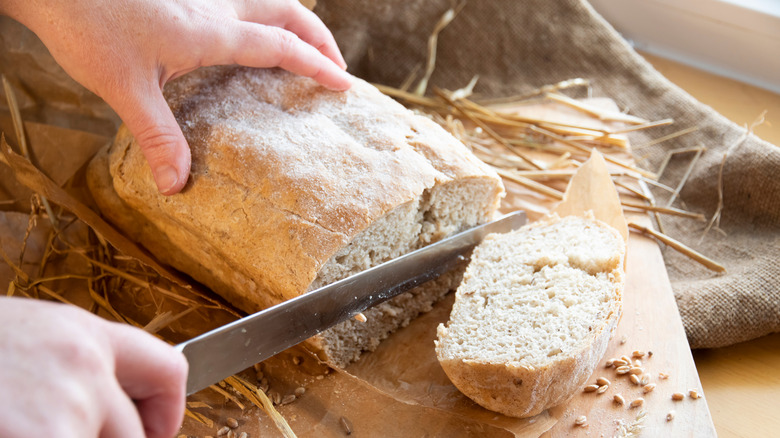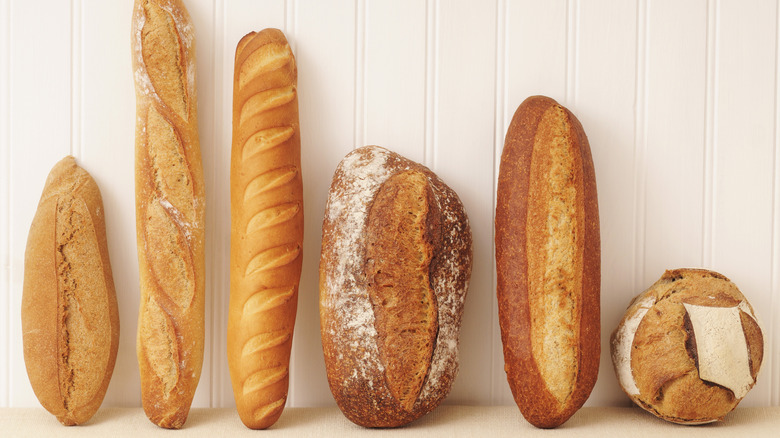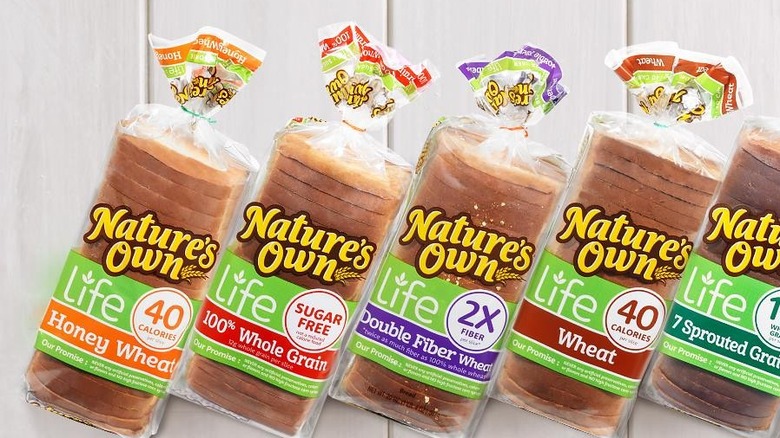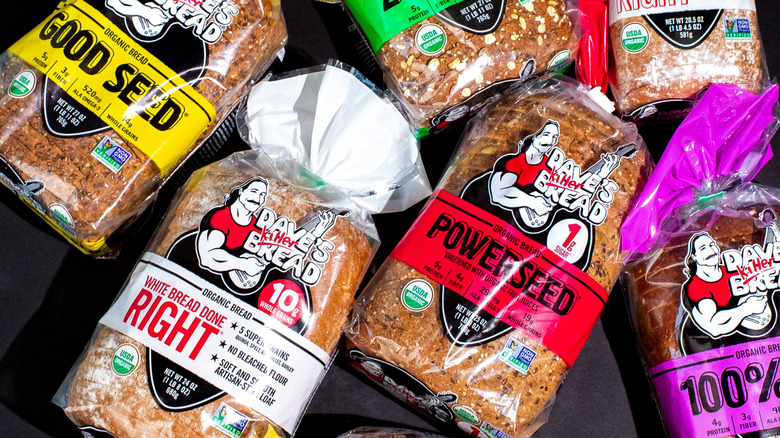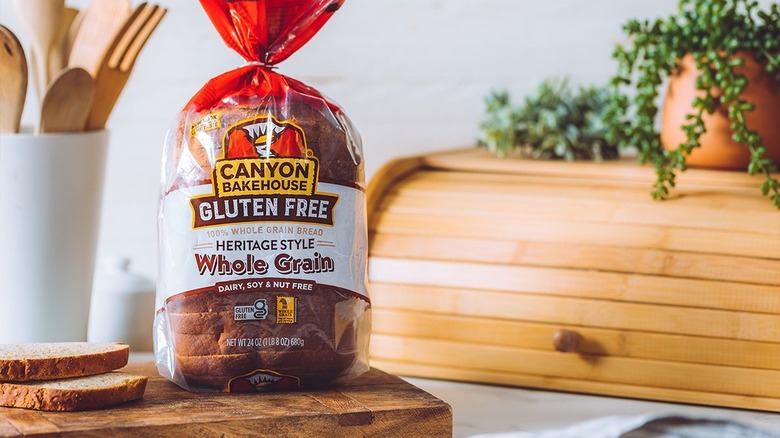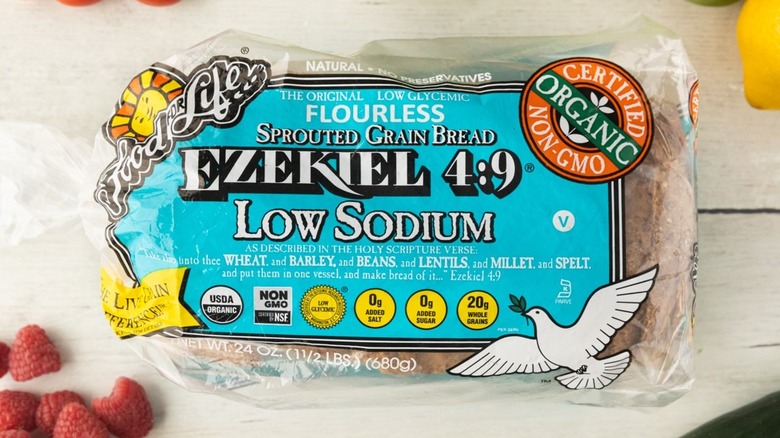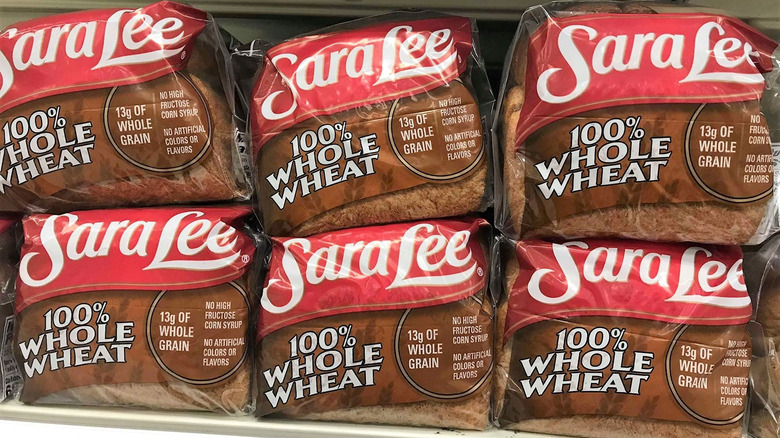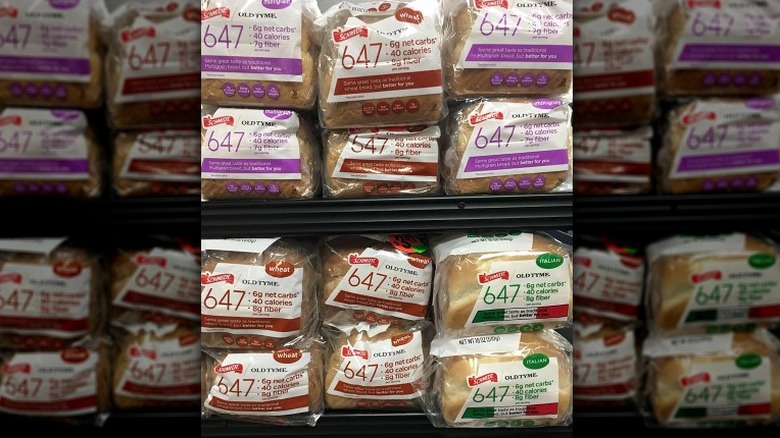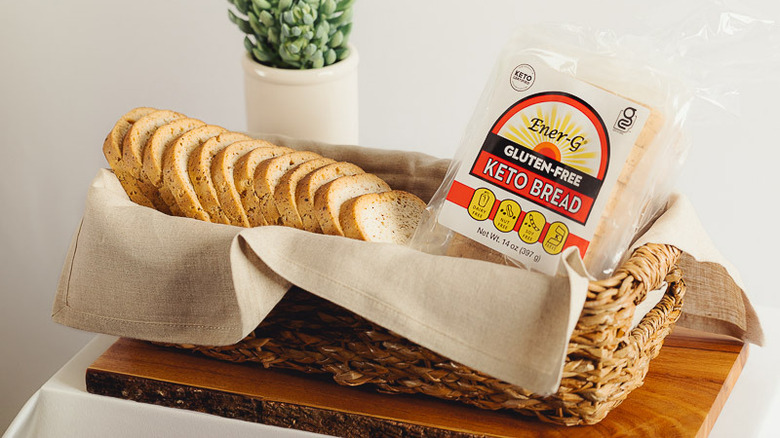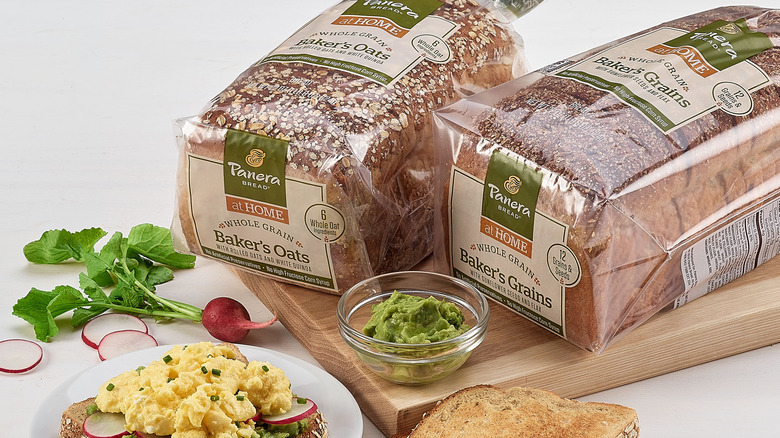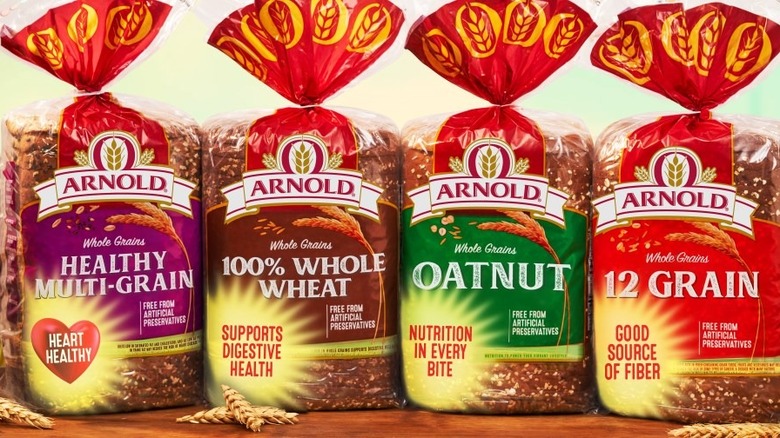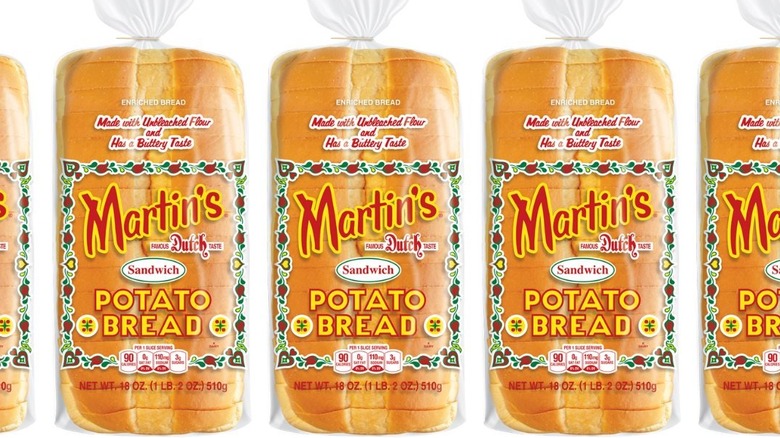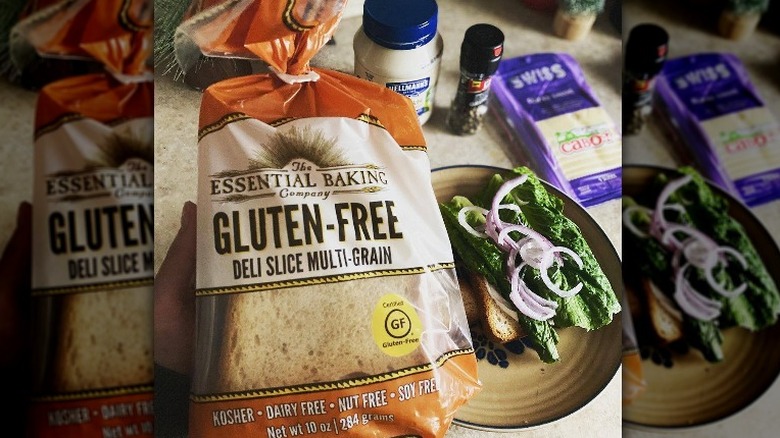11 Healthy Bread Brands You Can Find In Any Grocery Store
Let's be honest, it can be very difficult shopping for nutritious foods. Take bread, for example. For one person gluten is a strict no-no. For someone else, fiber content is the most crucial line on a product's nutritional information panel. Yes, when it comes to breads, there's no one size fits all option. But that doesn't mean there aren't some guidelines to help you make the best choices to meet your individual health needs.
Of course, a good starting point is checking if a brand uses tons of chemicals like artificial dyes in their breads. Other possible buzzwords and phrases to watch for include "organic," "non-GMO," "gluten-free," and "all natural." Even a manufacturer that uses natural ingredients could have breads that are high in sodium or sugar. Plus, it's not uncommon for a particular food brand to have a diverse portfolio of products, some of which you might want as your go-to bread option, while others might not be the right choice for your health.
So, no matter how you slice it (no pun intended), it's important to be a conscientious consumer and read food labels — not just when shopping for bread, but for all types of food. With that said, there are some brands in your local supermarket's bread aisle that stand out for their healthy product options.
How to shop for healthy bread
While an ingredients list may seem daunting at first, it's really just a case of being thorough. If you're looking to reduce the amount of calories in your diet, or attempting to lower your carb intake, it may be worth searching for a bread with a lower sugar content. The label may not specifically say "sugar," so watch out for ingredients like "high fructose corn syrup" if you're aiming to keep carbs low.
It's been suggested that whole grains have cardiovascular benefits, while sprouted grains can contain up to three times more vitamins and minerals than non-sprouted grains, while also being lower carb. You could consider adding these to your diet and looking for bread that includes them. If you have an allergy to certain grains, this may not be an option. If more fiber is what you're after, whole wheat may be something you'll want to consider. A slice of white bread contains 0.6 grams of fiber on average, while whole wheat averages around 2 grams, and contains more protein.
If you have a grain intolerance, you may have an easier time digesting bread made from "ancient grains." Some of these grains are even gluten-free, but consider consulting a medical professional for advice if allergies and intolerances are involved. You should always refer back to the ingredient list and nutritional information, as terms like "whole grain" and "high fiber" on the packaging can be used to disguise a low-quality product.
Nature's Own
With a name like Nature's Own, you'd assume this bread brand focuses on natural ingredients. And you'd be right. As it highlights on its website, it doesn't use artificial colors, flavors, and preservatives in its products. Its breads also do not contain high fructose corn syrup, an ingredient that has made headlines for all the wrong reasons. However, that doesn't mean their breads lack sweetness.
Several of Nature's Own breads use honey. And, yes, let's take a moment to address the elephant in the room: Honey is high in sugar. In fact, honey is basically pure sugar. However, research shows honey is a potentially good addition to your diet if you have health problems like high blood pressure or cholesterol.
Another highlight of Nature's Own products are they contain no trans fats, which have been connected to health problems like high cholesterol and heart disease. In fact, even though trans fats do occur naturally in foods made from animals like meat, the trans fats that are sometimes found in breads are more like another artificial ingredient. This is because some manufacturers create trans fats by altering the vegetable oil used to make their products.
Dave's Killer Bread
It's understandable if you thought that Dave's Killer Bread was founded by a rockstar because of its mascot. However, the real story is maybe not what you're expecting. The Dave in Dave's Killer Bread, David Dahl, started the company after serving time in prison. After returning home and working at his family's bakery, he and his nephew eventually introduced his own brand of bread at a farmers' market. But interesting backstory aside, how does David's Killer Bread stack up when it comes to nutrition?
Well, as the company's website emphasizes, Dave's Killer Bread is organic and non-GMO, which can be two big pluses if you're looking for a healthy bread option. The products, which include names like "Powerseed" and "Good seed," are just that, loaded with seeds, including sunflower seeds, flax seeds, and pumpkin seeds. The brand also doesn't skimp on grains like barley, rolled oats, quinoa, rye, and blue cornmeal. Plus, several of Dave's Killer Breads are sources of ALA Omega-3, which is an omega-3 fatty acid found in plants that can help your brain and your heart to function properly.
Although Dave's Killer Bread has many healthy pluses, some of its products do contain higher amounts of sodium than other breads mentioned in this article. So, if salt content is a concern for you, then you might want to try the company's thin-sliced varieties.
Canyon Bakehouse
We often think of the prepacked breads we see in the supermarket as products that pop off an assembly line. And yet, in cases like Canyon Bakehouse, these manufactured products have a connection to homemade breads. As the company's website explains, the start of this brand of bread was what so many of us do when we cook or bake: people experimenting with recipe ideas in their home kitchen. This eventually led to the creation of what Canyon Bakehouse is known for — their own take on gluten-free bread.
Besides being gluten free, Canyon Bakehouse breads are also nut, soy, and dairy free, making them a safe option for someone with an allergy or intolerance to certain ingredients often found in breads. Plus, the company's products are made from 100% whole grains, which can be good for your immune system.
In addition, several of CanyonBakehouse's Classic Breads contain buckwheat, a type of pseudocereal that is sometimes referred to as a superfood in part because of its potential to help manage weight and blood sugar levels. In fact, this little seed is loaded with several B vitamins (as well as vitamin K) and minerals like calcium, potassium, iron, phosphorus, and magnesium.
Food For Life
If you pick up a loaf made by the Food For Life Baking Co., there's an excellent chance you're going to see the word "sprouted" on the bag. This is because a major ingredient used by this bread brand is sprouted grains, which means they harvest and use legumes (like lentils and soybeans) and whole grains (like barley, millet, spelt, and wheat) when they're just beginning to grow. This, according to the company's website, unlocks nutrients that would not be present in the fully grown versions of these plants.
Besides sprouted grains, Food For Life has also introduced several lines of breads to accommodate different health needs and concerns. For example, while their breads that contain spelt and barley would not be good for someone with celiac disease because they're sources of gluten, the company has launched a gluten-free line. They also have a special line of products including breads for diabetics. In addition, they offer bread (as well as other product options) that are high in fiber.
Besides addressing health concerns, Food For Life also has a line of breads designed for vegans. In fact, the company's website explains that their vegan foods are specially crafted to include many important nutrients like iron, riboflavin, magnesium, niacin, calcium, thiamine, phosphorus, vitamin B6, zinc, and folic acid. Plus, Food For Life's vegan products are rich in both fiber and protein.
Sara Lee
It might seem odd to see Sara Lee, a company known for its decadent desserts, on a healthy brands list — almost as surprising as finding out that Sara Lee was not the founder of the company but the daughter of the founder who named his new business venture after his then 8-year-old child. But since its creation in 1949, Sara Lee has expanded into the bread aisle with several different product lines.
Prominently featured on the company's website are their Artesano Bakery Breads. In fact, Sara Lee created a special "red wax seal" for these breads' bags that states they're "always baked without artificial colors, flavors & preservatives." In addition, all of the Artesano Bakery Breads available at the time of this article do not contain high fructose corn syrup. And Sara Lee also has Delightful: a line of breads that each offer 8 grams of whole grains per slice. Plus, several members of the Delightful line advertise that they don't use artificial colors or flavors.
Although the Artesano and the Delightful lines of bread check a number of boxes when it comes to nutrition, both (to varying degrees) have higher sodium levels per slice than Consumer Reports recommends. So, if you want bread that doesn't contain artificial colors and flavors but has less salt, you might want to check out the Sara Lee and the Sara Lee's classic breads.
Schmidt Old Tyme
When a company has existed for over a century, it must be doing something right. Case in point, Schmidt Baking Company, whose roots go back to 1886. Today, this food manufacturer emphasizes how it uses natural and wholesome ingredients in its products, including its bread.
The majority of the sliced breads that carry the Schmidt Old Tyme label are both low-fat and cholesterol free. The company's website also advertises how a number of its products are good sources of nutrients like vitamin D, thiamin, and folate. And yes, these three vitamins are important for your good overall health. Vitamin D helps support your brain, heart, bones, teeth, and lungs, as well as your immune and nervous systems. According to the Mayo Clinic, thiamin and folate, which are both B vitamins, are crucial to keeping your cells developing and functioning properly.
Although Schmidt prides itself on using recipes created by its founder, it also has expanded into a line of breads called "Omega Me Crazy!" So named because of their emphasis on omega-3 fatty acids, these hearty breads are packed with ingredients like quinoa, oats, and barley, as well as flax, sunflower, and chia seeds. But sodium content does vary for all of Schmidt Old Tyme's products, so if salt is a concern, make sure to read the nutritional information panel before choosing your bread.
Ener-G
With roots dating back to Seattle's first flourmill in 1887, Ener-G was poised to continue producing low protein bread, which, according to the company's website, was a healthy option for patients with kidney issues. The company changed direction, however, when a medical professional told them that the gluten in their bread was not good for her patients with celiac disease.
Today, every loaf of bread offered by Ener-G is both gluten- and nut-free, making them a good option for not only someone with celiac disease but also anyone with a nut allergy or intolerance. In addition, their breads are non-GMO, preservative free, and either organic or plant based. Ener-G has also now introduced products that have been certified as good options for the keto diet. Plus, the majority of Ener-G's loaves of bread are low in sodium and sugar.
Besides offering classics like multigrain bread and raisin loaf, Ener-G also has bread products made from tapioca. While most of us think of tapioca as a pudding or the pearls in bubble tea, it can be a great choice for a gluten-free, allergy-friendly bread since this starch made from the cassava plant does not contain grains, nuts, or gluten. It also has a low salt content and is a safe option for digestive problems like diverticulitis and irritable bowel syndrome.
Panera Bread at Home
Even if you're not a bread connoisseur, you'll probably recognize Panera Bread, if only for its cafes. The company has a list of close to 100 ingredients and additive classes that it does not use in either its cafe or its grocery story products like bread. These include artificial colors and flavors, high fructose corn syrup, hydrogenated starch, and artificial trans fats like cooking oils that have been altered during the manufacturing process.
In addition to adhering to a strict "no-no list" (as the company calls it), the majority of the sliced bread loaves that are part of the Panera Bread at Home line are both dairy-free and suitable for someone following a vegetarian diet. What's more, most of them are made from whole grains like oats, bulgur, and cracked wheat.
But, there is one caution when selecting a slice of Panera's bread: While Panera goes out of its way to produce breads from natural ingredients, the majority of its grocery store breads do exceed the Consumer Reports recommended amount of sodium per slice. Now, to be fair, this isn't always by a large amount. For example, its Baker's Oats Whole Grain Bread is only 10 milligrams over the advised salt content limit. However, the Artisan Breads are very high in sodium. So, it's important to read the nutritional information panel before choosing the right Panera bread for your dietary needs.
Arnold
If you visit Arnold's website, you'll see a phrase that you don't find on most food sites: "no added nonsense." What this means is the company stopped using certain ingredients in the majority of its products, including artificial preservatives, synthetic colors, bleached flour, partially hydrogenated oils, and high fructose corn syrup. Other "added nonsense" ingredients not found in most of Arnold's products are the food additives azodicarbonamide (ADA), SSL/CSL, and potassium bromate.
Offering several different bread varieties, Arnold has a line of organic loaves that are all non-GMO. The majority of these organic breads are plant based and made from such healthy ingredients as hazelnuts and sunflower oil. The company also uses whole grains, which are rich in vitamins like A, E, and D, as well as sprouted grains that have nutrients that fully matured grains don't. And while some of Arnold's organic line uses some sugar, it's cane sugar, which could help with energy levels and mood.
Besides Arnold's organic line, the company introduced a sliced bread suitable for the keto diet. There are also several healthy stand out breads that fall under the Arnold's "Favorites" category, including ones that are made from oats, a grain, that according to a study in the "American Journal of Lifestyle Medicine" could help lower the chances of developing coronary heart disease.
Martin's
Like many companies, Martin's Famous Pastry Shoppe, Inc. began as a small venture that eventually grew into a major brand. As the company's website explains, the "birthplace" of the business was a one-car garage. Since then, other manufacturers have tried to copy the taste and texture of Martin's products, which are made from ingredients like 100% stone-ground whole wheat flour. Other foods you'll find on a typical Martin's nutrition label include nonfat milk, sunflower oil, cane sugar, and potatoes.
Of course, it's impossible to talk about the company without mentioning Martin's potato rolls and loaves. The original version of this product is what helped launched the business more than 60 years ago. Fast forward to today, and you'll find the company has expanded to include a 100% whole wheat version of their flagship bread loaf. But beyond the individual flavors of Martin's breads are their nutritional value. All their current bread loaves contain calcium, which is not only important to help keep your bones healthy but also supports your muscles, nerves, and heart's health. Additionally, Martin's bread loaves all have the nutrients iron, potassium, thiamin, and riboflavin, and some also contain niacin and folate. Although Martin's is made from healthy ingredients, there is one important reason you should still check the nutritional information panel on their breads' bags: The sugar content for their loaves can fluctuate and exceed Consumer Reports recommended amount per slice.
The Essential Baking Company
It was a chance meeting that led to the creation of The Essential Baking Company. Both George DePasquale and the late Jeff Fairhall had an interest in the food industry. In fact, Fairhall had a wrap sandwich business when he and DePasquale decided to cofound the company.
Today, The Essential Baking Company's website emphasizes how they hand select their ingredients from local sources. All of their breads always begin with the same natural ingredients: naturally occurring yeast, flour, water, and sea salt. The company currently has a line of gluten-free breads that are all also dairy, nut, and soy-free. In addition, several of their gluten-free loaves are made with bamboo fiber, which might help lower cholesterol and support digestive health. Plus, bamboo is packed with vitamins like A, B6, and E, as well as other nutrients, including iron, potassium, copper, zinc, chromium, calcium, and manganese.
In addition, to its gluten-free breads, The Essential Baking Company also offers a variety of sliced artisan loaves. However, you do want to check the sugar and sodium levels, which can greatly vary for all of their breads.
